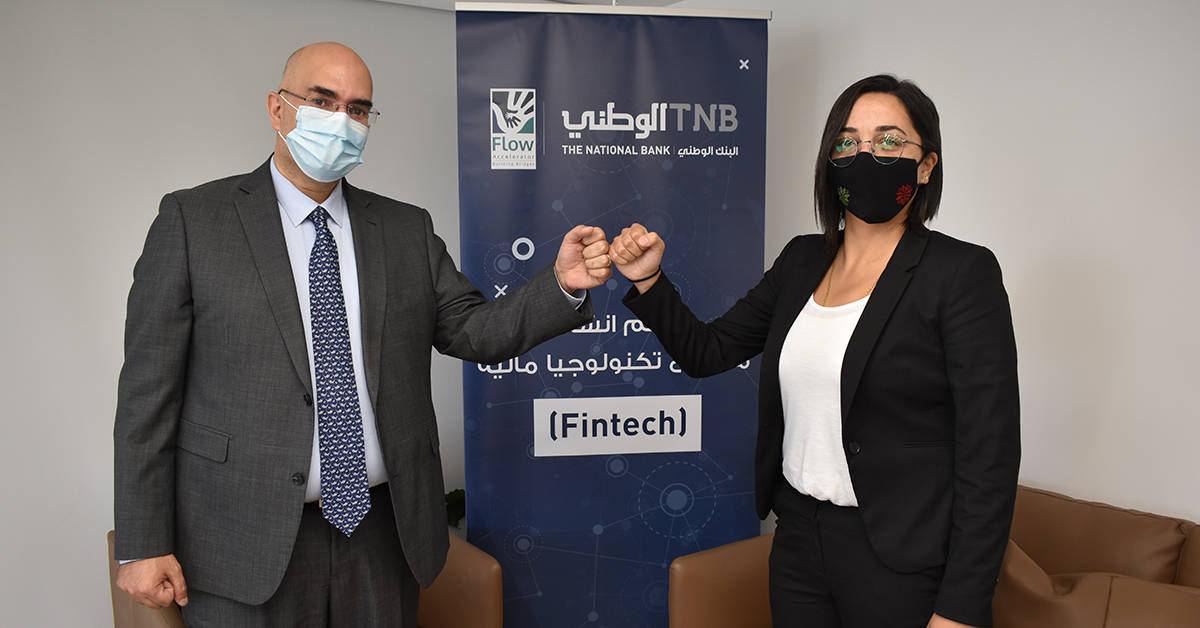As part of its social responsibility, the National Bank and Flow Accelerator announced their cooperation to support financial technology startups in Palestine.
This collaboration is a result of the two parties previously signed agreement, and it is consistent with the National Bank’s approach of launching responsible banking products and services linked to its sustainable social responsibility program.
This initiative was linked to the launch of its electronic services (online and mobile) this year, as well as the remote bank account opening service through (Onboarding).
Under the terms of the agreement and the implementation of Flow Accelerator, a 12-week incubation program (FinTech Camp) will be held, which will include a series of intensive coaching sessions to develop new financial technology tools with the assistance of industry experts and specialists.
Salameh Khalil, CEO of the National Bank, commented on this, saying that this initiative is part of the National Bank’s social responsibility to contribute to the development of digital tools and solutions that will meet the urgent needs of the Palestinian financial industry, and through the hands of our promising Palestinian youth who can compete in the field of digital technology on a global scale.
We are addressing the sustainable development of an important sector on which the future of digital banking and financial transformation in Palestine is dependent by providing opportunities and financing to support entrepreneurial startups led by young Palestinian men and women, he added.
Khalil emphasized the importance of developing the financial and banking digital technology sector in Palestine, as well as the National Bank’s efforts to keep up with rapid global developments in this field and transfer them to the homeland,
pointing out that this directly reflects on improving the customer experience and the services provided accordingly, as well as providing customers with multiple options.
He also emphasized the importance of investing in digital technology in order to effectively contribute to increasing financial inclusion in Palestine.
Majd Khalifeh, CEO of Flow Accelerator, stated that this collaboration is in line with the accelerator’s mission and programs to support entrepreneurial youth in conceptualizing innovative ideas in their early stages through mentorship, guidance, networking, and financing in order to prepare technology-based start-ups to enter the implementation phase and begin building traction for product-market fit.
The FinTech Camp aims to innovate and conceptualize 3 to 4 solutions utilizing technology for gaps and challenges in the financial sector, as well as raise awareness about the use of financial technology among young entrepreneurs through startup methodology based on Lean Methodology and contribute to attracting strategic interest in this sector.
Flow Accelerator will work with all relevant stakeholders in the financial sector, including regulatory and legislative authorities, as well as enablers in the Palestinian innovation ecosystem, to ensure the provision of resources and optimal guidance for innovators to achieve tangible results for launching startups at all stages of the program, which begins with an awareness campaign through Social media platforms, and then proceeds to a boot camp for a select group of qualified entrepreneurs, then to the incubation phase to develop and prototype solutions for the winners, and finally to the final demo day with all interested stakeholders from financial institutions, investors, and business accelerators.
Khalifeh stated that the National Bank’s announcement to allocate a portion of their social responsibility to this aspect coincides with the growing momentum in the Palestinian entrepreneurial ecosystem in general, as well as the Palestinian Monetary Authority,
the Palestinian Capital Market Authority, and other international development projects directing attention, including financial and technical resources to FinTech.
She also encouraged the Palestinian private sector, including public shareholding companies, to direct a portion of their social responsibility toward innovation and creativity in the Palestinian production and service sectors, owing to the tangible economic and social impact and integrative value chains they create.
